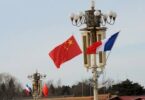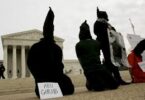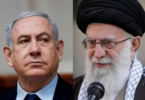Petr Akopov
Biden is worried about Putin – he said that the Russian president “right now has no way out” of the special operation in Ukraine:
“Putin is a very calculating person. And the problem is that the Russian leader has no choice right now. And I’m trying to figure out what we can do about it.”
That is, the US president is worried because he does not understand how Putin will behave. And he does not understand this because he believes that the President of Russia made a mistake and now he himself is in an agonizing search for a way out of this situation. Where did Putin go wrong? Putin mistakenly assumed that an attack on Ukraine would split NATO and the European Union, Biden said, but instead the United States and many European states came to Ukraine’s aid.
Biden said all this at a meeting to raise funds for the Democratic Party’s election campaign, and the next day an interview with the largest American foreign policy strategist, former US Secretary of State Henry Kissinger, appeared in the Financial Times. His first interview during the fighting in Ukraine. And he also talks about Putin’s mistake:
“Putin miscalculated the situation he faced on the international stage, and he obviously miscalculated Russia’s ability to fight such a big war.”
Kissinger is not only older, but also more perspicacious than Biden: in recent years, he advised the Washington administrations not to overdo it with pulling Ukraine to the Atlantic side, warning that it should be a bridge between the West and Russia, and not an outpost of one of the parties.
And most importantly, what Kissinger always said is that one should not forget about the importance of Ukraine for Russia.
But it was precisely the conscious ignorance of this warning that was Biden’s main principle both in 2014 and on the eve of February 24 – and became his main mistake, because it was not in the interests of the United States to bring matters to a war, the reaction to which highlighted the entire limitation of their influence on non-Western world.
Nevertheless, now Biden is talking about Putin’s miscalculation, and if this can be attributed to propaganda, then Kissinger’s similar words should be taken as his sincere opinion. Allowing you to better understand what is the main flaw in the worldview of even the smartest and most sober American strategists and analysts.
If Biden really believes that Putin expected our operation in Ukraine to split NATO and Europe, then he has a very poor idea of Russia’s assessment of Western policy. The Kremlin did not expect any split, because it was convinced of its unreality both in all previous years, and especially in the last three months of negotiations.
After our November demand, Moscow saw the common position of the West: a firm refusal to give guarantees that Ukraine would not join NATO. So there was no stake on a split after the start of the special operation – which is why Putin immediately warned so harshly about the inadmissibility of interference from outside, that is, from NATO. Did the supply of Western weapons come as a surprise to Moscow?
No, although they might not have reached them if the resistance of the Ukrainian army had been broken in the first weeks. But this has nothing to do with counting on a split in the West, which, of course, Putin did not have.
But there was an understanding that the Atlanticists would try to fight with Russia with Ukrainian hands for as long as possible. And it only strengthened in the course of hostilities.
Kissinger says that Putin miscalculated with the international situation, apparently referring to the reaction of the West, which declared “total economic war” with massive sanctions. But what leads to such a conclusion? All the actions of Russia in the very first days after the start of the special operation – including in the banking sector – show that the Kremlin was preparing for the worst scenarios of an economic war.
Yes, there was an option that the West would not immediately decide to block the assets of our Central Bank, but it was considered only because it was initially clear what serious reputational (and financial, albeit delayed) damage it would cause to the Western countries themselves and the global financial system built by the Anglo-Saxons. As a result, everything went according to the most severe scenario, but this did not come as a surprise to Russia.
Now both Biden and Kissinger are worried about Putin’s further actions – they are afraid to transfer them to Russia, to provoke an escalation of the conflict beyond Ukraine. There is no doubt that they do not want this, but at the same time they are quite seriously considering the possibility of Russia using nuclear weapons. As Kissinger says:
“We need to understand where the internal red line of the opposite side is. How long will this escalation continue and how big are the opportunities for further escalation? When will this point be reached? Will it develop into a category of weapons that have never been used in 70 years of its existence?
Both sides are multiplying new types of increasingly destructive and technically sophisticated weapons, the use of which can lead to a disaster of a previously unimaginable scale.
The international community avoids discussing what action would be required if such weapons were used. The West cannot simply accept the use of nuclear weapons if that happens.”
That is, the United States believes that Russia is already ready to use nuclear weapons, although Moscow constantly reminds us that we view them as a means of deterrence and retaliation.
That is, we are not going to strike either at Ukraine or at NATO countries – why should we provoke a war with the Atlantic bloc? So why suggest the opposite to Western public opinion, just to further demonize Russia?
Or to justify the rejection of direct military intervention, but here everything seems to be clear anyway – Russia has indicated everything almost in plain text. The introduction of Western troops is unacceptable, but in the West they are increasingly wondering if at some point the growth in arms supplies will not be the drop that will overwhelm Moscow’s patience and force it to draw a new red line, that is, in an ultimatum form, demand their cessation? This, in fact, is what Kissinger warns about – and, of course, Biden thinks about it too.
After all, no one has forgotten either his calls to overthrow Putin, or the fact that the goal of supporting Ukraine is directly declared to be the defeat of Russia. The Anglo-Saxons do not want to cross the line – they really want to use the Ukrainian front to the maximum to weaken Russia, but they want to be sure that Moscow will not raise the stakes.
At the same time, the States are assessing what the new world will be like after the end of the war. And here even Kissinger cannot accept the new reality – he admits that the geopolitical situation in the world will change a lot, but still hopes that the States will remain playmaker:
“Having the same interests on all possible issues is not a natural state of affairs for China and Russia. I do not think that we can create potential differences, but I believe that circumstances will do it.
The alliance between Russia and China as a whole is not in the interests of the West, but it cannot be permanent. After the special operation in Ukraine, Russia will have to at least reassess its relationship with Europe and its overall approach to NATO. I consider it unwise to take a hostile attitude towards both opponents, contributing to their rapprochement.
China is now thinking about how to avoid the situation in which Russia finds itself under powerful sanctions pressure and avoid a coherent response from a large part of the world in the event of a full-blown crisis in relations between Beijing and Western capitals.
That is, the former secretary of state is betting that the alliance between Moscow and Beijing will not be durable, so if the United States itself does not openly antagonize China and Russia, then the balance of power will change over time.
While he stipulates that this does not mean that Moscow or Beijing “will become a close friend of the West,” it is understandable that Kissinger still hopes that the era of Western dominance is not over. And this is a fundamental mistake, excusable for the 98-year-old patriarch of American geopolitics.
But even such advice cannot be used by Washington, because most of the current American strategists are confident that their country will withstand a simultaneous confrontation with China and Russia. Moreover, after all that the United States has done in recent years (with the exception of Trump’s attempts), they simply do not have the opportunity to change their course towards the simultaneous containment of Russia and China.
They raised the stakes on both fronts – and if with Russia, in principle, all the pots have already been broken, then China is almost openly declared the main enemy and threat and will no longer believe in any assurances about “peace and friendship.”
Therefore, almost the only option for a serious change in the US foreign policy strategy in the short term remains domestic political upheavals with a landslide retreat into semi-isolation. But the Americans, of course, do not want to believe in this, preferring to say that Putin has no way out.
Although Putin is not looking for a way out, the special operation in Ukraine is the beginning, not the end of Russian politics. Its military component may proceed in different ways, but its geopolitical goals are clear. Biden could understand them if he realized what Ukraine is for Russia, and if he did not live in a world of illusions about the total superiority of the West.
Russia will not stop until it returns Ukraine, until it gets it out of Western influence, no matter how much time and effort it takes.
The West may resist, may delay this process, but in the end we will get our way anyway.
And the more forces the West spends on counteracting this, the more damage it will inflict on itself, accelerating the end of the era of Anglo-Saxon domination.
Recalling his many meetings with Putin, Kissinger (and he spoke with the Russian president much more often than Biden) says he thought his beliefs were “a kind of mystical belief in Russian history.”
It is indeed very important for Putin to know his native history, its lessons and patterns, including those relating to millennial relations with the West. This is what allows us to clearly understand who we are dealing with – and not to have any illusions, not to look for any exits where there are none, or where traps are set. And go to the end – to the intended goal.






